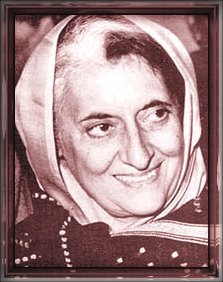|
|
|

Mrs. Indira Gandhi was the first lady Prime Minister of India and the third incumbent of the high office, is the only surviving issue of Pandit Jawaharlal and Kamala Nehru, Born on 19 November, 1917, educated at various institutions including Tagore’s Santiniketan (1934-35) and Samerville, Oxford (1936-41).
She has no formal academic degree but is a voluminous reader and good speaker. Married Feroze Gandhi, a Parsee Middle class youngman who was no relation on Mahatma Gandhi in 1942.
Took a prominent part in the freedom-movement, was lathi charged by the Police in 1942 at Lukknou and suffered imprisonment for nine months in 1943. Mother of two sons, Rajib and Sanjoy, became a widow in 1960.
Has had a unique practical training in politics and experience of men and affairs as the president of the Indian National Congress (1959-60) and as the understudy and official hostess of her father Jawaharal during his Prime Ministership (1947-64) and as the Minister of Information and Broadcasting (1964-65) in Lal Bahadur Shastri’s Ministry before she was elected a large majority as the leader of the Congress Parliamenentary party in 1965 and became the Prime Minister of India on 24 January, 1966 which office she has since been holding. She and her Government are committed to the policy of the rapid introdution of socialism in the country. In pursuit of this policy the lerger Banks and General Insurance Companies working in India have been nationalised. The abolition of the Privy Purses of the Indian princes, the imposition of ceilings on incomes and on urban properties and other such measures for removing social inequalities have been promised. She was assassinated by her body guard in the year 1984.
Her Assasination
On October 31, 1984, Indira Gandhi, the Prime Minister of India, was shot down while walking from her house to her office in New Delhi, India's capital city. The fatal shooting was carried out by two men who were members of her personal bodyguard. The shooting marked an abrupt and tragic end to the lengthy political career of the woman who was not only India's first female prime minister, but also the daughter of the very first prime minister of India. Her assassination was indicative of the deep unrest in India, brutally forcing to the surface problems which had been simmering in the country for decades.
India, which had long been a British colony, did not achieve complete independence from Great Britain until 1948. The path to Indian independence was a long and bloody one, marked by religious and political strife in this ethnically and religiously-mixed country. When India finally did become independent, it was only after a large part of her territory was partitioned off to form a new country, Pakistan. Independent India came to have a predominantly Hindu leadership, although there were many Muslims living in the country, while Pakistan had a Muslim government. Many Hindus in the country were very dissatisfied with the loss of land which resulted from the establishment of Pakistan. As a result, relations between India's Muslim and Hindu population were often strained, frequently erupting into bloodshed as one or the other side felt underrepresented or unfairly treated.
It was in this unsettled atmosphere that Indira Gandhi first came to power. She was chosen as Prime Minister in 1966, and with the exception of a three year period during which she was first voted out of office and then subsequently voted back in, Gandhi remained the Prime Minister until her death. During her tenure she faced the formidable tasks of trying to create political stability, appease both the Hindu and Muslim communities, and develop the fragile economy of this newly independent and impoverished country.
Gandhi was a controversial figure in Indian politics. She was accused by many of being a dictator whose focus on enlarging her own sphere of power led her to neglect the needs of her country, swinging it further into poverty. When she was voted out of office in 1977 it was as a result of an increasing public opinion that Gandhi was too authoritarian, and that she did not have India's interests in mind. But, despite the existence of strong public sentiment against her, Gandhi proved remarkably resilient. During much of her political career she was extremely popular among the majority of Indians, who saw her as the "Mataji," or Great Mother of India, and as the single most stabilizing force in Indian politics.
One element which was increasingly dissatisfied with the Indian government was the Sikhs, a sect whose followers totalled 13 million, a small but still substantial percentage of India's total population of 750 million. Many Sikhs felt that Indian society discriminated against them both culturally and politically. In an effort to make the Sikhs' case heard, some members of the Sikh community became increasingly militant, even to the point of committing terrorist acts. Disputes between Sikhs and Hindus were frequently the source of riots and other political violence.
In an effort to contain religious violence, Gandhi began to crack down severely on Sikh militants. In June of 1984, she sent Government troops into the Golden Temple, the most holy of all Sikh shrines, because it was suspected of harboring terrorists. When the temple was raided, it was found to be harboring leaders of the Sikh terrorist movement as well as stores of weapons. A large fight erupted between the military and Sikh militants during the raid of the temple. The Golden Temple incident became one of the bloodiest events in India's recent history; at least 600 people were killed in the fighting. The Golden Temple events unleashed a rage among many of the Sikhs, who felt that the Indian government had used undue force, and had debased their most sacred Shrine, thus showing a complete disregard for Sikh culture and religion.
Throughout the summer of 1984 Gandhi continued to clamp down on Sikh militants. The struggle between Gandhi and the Sikh militants finally culminated in her assassination by two members of her own bodyguard, both of whom were Sikhs. The two assassins were apprehended, and were subsequently convicted, along with a third accomplice, of the murder of the Prime Minister. The three men received the death sentence.
The death of Prime Minister Gandhi was followed by widespread rioting and other violence. Her son, Rajiv Gandhi, who took over after the death of his mother, found the task of bringing calm to this deeply rocked country to be extremely difficult. It was only after many deaths and the intervention of the Indian military that a fragile and deceptive calm was restored to the country. Instability and political and ethnic violence have continued to trouble India until the present day, with no resolution in sight to the complex problems which plague this young country.
